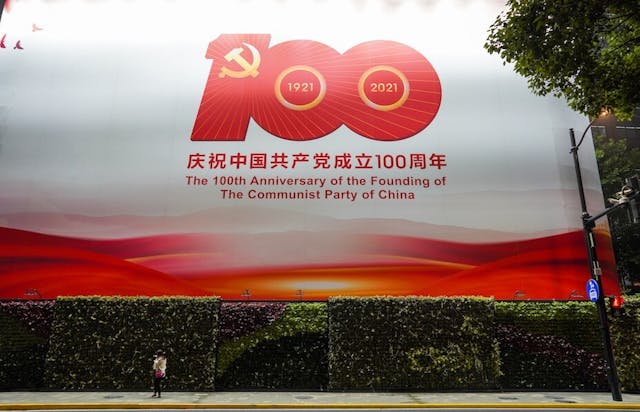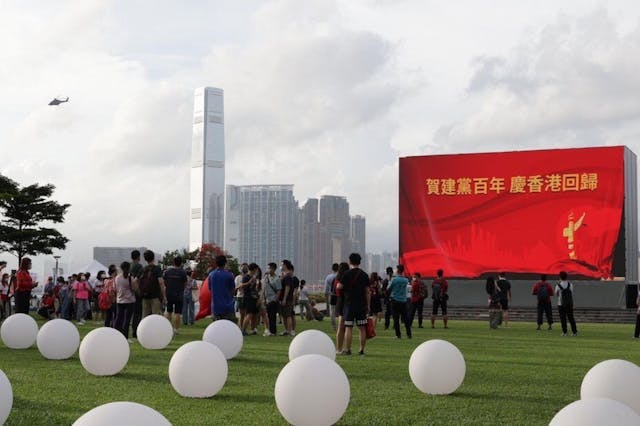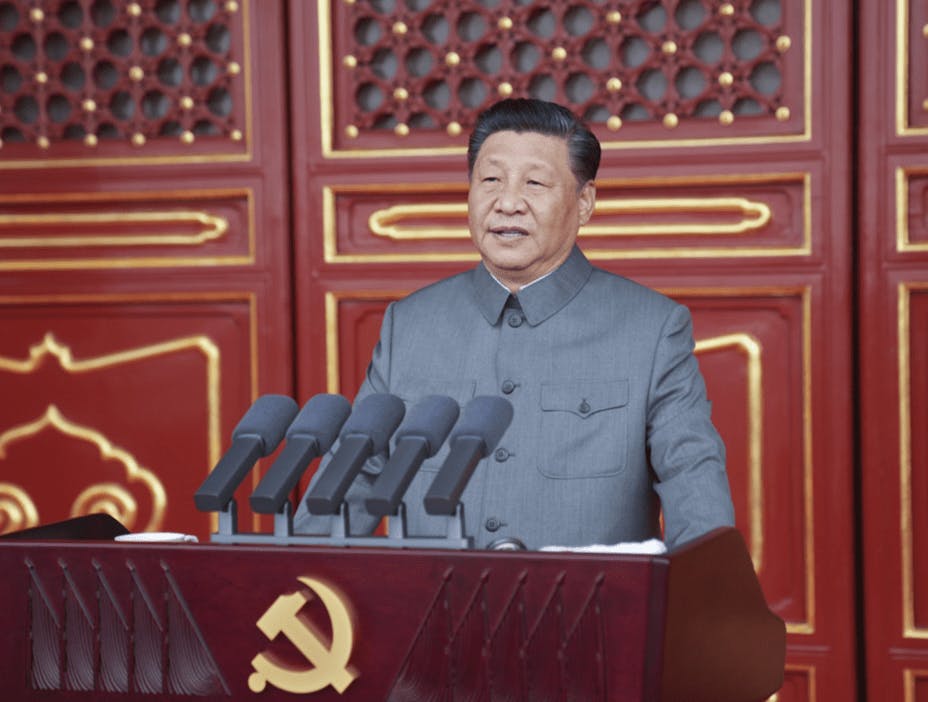2021 年 7 月 1 日,習近平總書記在中國共產黨成立一百周年之際發表的講話,對香港和澳門的社會經濟和政治發展具有深遠影響。
沒有中國共產黨 就沒有新中國
習近平在講話中強調,中國共產黨領導中國「全面建成了小康社會,歷史性地解決了絕對貧困問題,正在意氣風發向着全面建成社會主義現代化強國的第二個百年奮鬥目標邁進」。這不僅是中國人民的「偉大光榮」,而且是中國共產黨的「偉大光榮」!
習近平強調中華民族是偉大的民族,有着5000多年源遠流長的文明歷史,但在1840年鴉片戰爭後蒙受恥辱。 因此,實現「中華民族偉大復興,就成為中國人民和中華民族最偉大的夢想」。
從太平天國運動、戊戌變法、義和團運動、辛亥革命接連而起,各種救國方案輪番出台,到「十月革命一聲炮響,給中國送來了馬克思列寧主義」,中國共產黨應運而生,他讚揚100年來,毛澤東、鄧小平、江澤民、胡錦濤、周恩來、劉少奇、朱德、陳雲等歷屆中共領導人,把馬克思主義與中國國情相結合,為中國共產黨的建立、鞏固、發展作出重大貢獻。

習近平在意識形態上強調要堅持馬克思列寧主義、毛澤東思想、鄧小平理論、「三個代表」思想和科學發展觀,全面貫徹新時代中國特色社會主義思想。 他又表示,要繼續發展當代中國馬克思主義、21世紀馬克思主義。
在談到堅持中國共產黨的領導時,習近平表示,中華民族近代以來180多年的歷史、中國共產黨成立以來100年的歷史、中華人民共和國成立以來70多年的歷史都充分證明,「沒有中國共產黨,就沒有新中國,就沒有中華民族偉大復興」。中國共產黨領導「是黨和國家的根本所在、命脈所在,是全國各族人民的利益所繫、命運所繫」。因此,他強調要提高共產黨的「科學執政、民主執政、依法執政水平,充分發揮黨總攬全局、協調各方的領導核心作用」。
推動一帶一路發展 為世界發展提供新機遇
他又說,中國共產黨始終代表「最廣大人民根本利益」,但不代表任何利益集團或特權階層的利益。「任何想把中國共產黨同中國人民分割開來、對立起來的企圖,都是絕不會得逞的,9500多萬中國共產黨人不會答應!」
習近平強調,強國必須強軍,軍強才能國安,要堅持黨指揮槍,堅持走中國特色強軍之路。
另一方面,他表示,中國必須高舉「和平、發展、合作、共贏」的旗幟,奉行獨立自主的和平外交政策,堅持走和平發展道路,推動建設新型國際關係,推動構建「人類命運共同體」,推動共建「一帶一路」高質量發展,以中國的新發展為世界提供新機遇。
習近平指出,必須加強團結海內外中華兒女,中國共產黨必須把統一戰線工作擺在重要位置,團結一切可以團結的力量,實現中華民族偉大復興。他又強調,要牢記「打鐵必須自身硬」的道理,堅決清除一切「損害黨的先進性和純潔性」的因素,清除一切「侵蝕黨的健康肌體的病毒,確保黨不變質、不變色、不變味,確保黨在新時代堅持和發展中國特色社會主義的歷史進程中始終成為堅強領導核心」。
準確貫徹一國兩制 實現祖國完全統一
在港澳問題上,習近平強調要全面準確貫徹「一國兩制」、「港人治港」、「澳人治澳」、高度自治的方針,落實中央對香港、澳門特別行政區全面管治權。香港和澳門都必須落實維護國家安全的法律制度和執行機制,維護國家主權、安全、發展利益,維護香港、澳門社會大局穩定,保持香港、澳門長期繁榮穩定。
關於台灣問題,習近平表示,「解決台灣問題,實現祖國完全統一,是中國共產黨矢志不渝的歷史任務,是全體中華兒女的共同願望」。 但是,要堅持一個中國原則和「九二共識」,推進和平統一進程。 他重申,堅決粉碎任何台獨圖謀。 他說;「任何人都不要低估中國人民捍衛國家主權和領土完整的堅強決心、堅定意志、強大能力!」

總之,習近平的歷史性講話,不僅對香港、澳門以至至台灣的社會經濟發展,都具有深刻的意義。
首先,隨着《港區國安法》2021年6月下旬頒布和實施,香港人必須明白中國對特別行政區落實「全面管治權」的意義,意味着香港人必須擁護中國共產黨,欣賞共產黨對中國和一國兩制的巨大貢獻,尊重中央政府維護國家主權、安全和發展利益。
同樣地,已經理解並充分尊重中國「全面管治權」的澳門人,也必須尊重中央政府維護國家主權、安全和發展利益。
澳門的社會局勢遠比香港穩定,香港在2019年下半年陷入社會動盪和暴力衝擊。可以預見,《基本法》23條很可能不久將在香港通過立法。 正如新任保安局局長鄧炳強最近提到,早在2009年2月,澳門立法會已經完成國家安全立法。
貫徹一個中國原則與九二共識
在充分維護國家安全利益的情況下,香港和澳門將能夠享受到國家賦予的一切特殊政策、利益和支持。未來幾年,香港和澳門將加速融入大灣區,並為兩個城市帶來更多的經濟效益和繁榮,尤其是在新冠疫情受到控制並逐漸消失的情況下。
在台灣問題上,中央一貫堅持一個中國原則和「九二共識」,挑戰在於台灣當局是否尊重大陸政府的底線。鑑於新冠病毒及其變種病毒的迅速傳播,已經削弱了當前台灣政府統治的合法性,國民黨會否在台灣 2024 年的總統大選前見證其復興?
如果國民黨有可能在台灣重新掌權,那麼國共另一次合作不僅是可能的,未來幾年甚至有機會實現習近平統一台灣的願景。換言之,大陸與台灣官方,尤其是國民黨精英之間的動態互動,將是中國共產黨如何努力實現其未完成任務的最重要指標。
綜上所述,習近平的歷史性講話對香港、澳門和台灣均具有重大的政治意義。隨着中國共產黨進入第二個百年征程,一方面維護港澳繁榮穩定,另一方面實現國家完全統一,將優先擺上中共議事日程,因為已故中共領導人鄧小平希望香港和澳門的一國兩制為大陸統一台灣提供示範,仍然是未完成的任務。
A Historical speech with implications for Hong Kong, Macau and Taiwan
The speech delivered by President Xi Jinping during the centennial anniversary of the establishment of the Communist Party of China (CPC) on July 1, 2021, had profound implications for the socio-economic and political development of the Hong Kong and Macau special administrative regions.
First and foremost, President Xi, who is also the Party’s General Secretary and the Chairman of the Central Military Commission, emphasized that the CPC has led China to “fully establish a xiaokang(an affluent) society” and that it is keen to construct the People’s Republic of China (PRC) into a “socialist, modernized and powerful country in the second 100 years.” This is the “great honor” of not only the Chinese people but also the CCP.
President Xi harped on the theme of stressing Chinese nationalism, emphasizing that, with 5,000 years of civilization, China suffered from national humiliation after the 1840 Opium War. As such, the realization of the “Chinese renaissance” is the “greatest ideal of the Chinese people and the Chinese nation.” President Xi invoked the historical nationalistic sentiment of the Chinese people by referring to how the Chinese people fought for their national survival, ranging from the Taiping rebellion to the Hundred Days reform, and from the Boxer rebellion to the 1911 revolution. Amid these difficult paths of modernization, the CPC emerged, thanks to the Sinification of Marxism-Leninism. He praised all the previous Chinese leaders who adapted Marxism to the Chinese circumstances, and who developed the CPC further, including Mao Zedong, Deng Xiaoping, Jiang Zemin, Hu Jintao, Zhou Enlai, Liu Shaoqi, Zhu De and Chen Yun.
Ideologically, President Xi laid the emphases on the need to persist in the belief in Marxism-Leninism, the Mao Zedong Thought, Deng Xiaoping Theory, the Theory of Three Represents, and the Scientific Outlook on Developmentt, and and fully implement the Thought on Socialism with Chinese Characteristics for a New Era. He remarked that Chinese Marxism would have to be developed further in the 21stcentury.
On the role of the CPC, President Xi remarked that the Party realizes the Chinese renaissance, solidifies the Chinese people, liberates their thoughts, achieves the great success of the open-door policy and socialist modernization as well as construction. He said: “Without the CPC, there would not be the new China and there would not be the Chinese renaissance.” The CPC coordinates “all the interests of the nationalities” in the entire country. It has to persistently “elevate the standards of the Party’s scientific governance, democratic government, the implementation of law and the full development of the Party’s coordination and provision of core leadership.”
President Xi added that while the Party represents “the root interests of the people,” it does not represent any interest group or privileged stratum. As such, “any attempt to separate the CPC from the Chinese people and to make their relationships confrontational is bound to fail and is destined to be rejected by 95 million CPC members.”
President Xi stressed the importance of having a strong military to ensure national safety and security. The Party must lead and instruct the military, while China must insist on the path of strong military with Chinese characteristics.
On the other hand, China, according to President Xi, raises the flag of “peace, development, cooperation and mutual win-win situation” and adopts the foreign policy of “independence, autonomy and peace.” The PRC foreign policy is characterized by its peaceful developmental path and the construction of new international relations as well as “the construction of the common destiny of the mankind.” As such, the Belt and Road initiative can provide high-quality development and new opportunities for the world through China’s new developmental path.
Finally, President Xi stressed that to unify the Chinese people inside and outside China, the CPC must put its united front work on top of its agenda, consolidating all the forces and achieving the objective of the Chinese renaissance. To strive for success, the Party must inculcate a strong political consciousness of governing itself effectively and assertively by eradicating “all the viruses that erodes the health and skin of the CPC.” Under these circumstances, the Party “will by no means change its quality, color and taste,” while simultaneously becoming the “strong core leadership” in the path of developing Chinese-style socialism.
On the question of Hong Kong and Macau, President Xi stressed that we must “accurately implement the principles of ‘one country, two systems,’ ‘Hong Kong people governing Hong Kong,’ ‘Macau people governing Macau,” a high degree of autonomy and the central authorities’ comprehensive jurisdiction” over the two cities. Moreover, both Hong Kong and Macau must implement “the legal system and implementation mechanism of protecting [China’s] national security and national sovereignty, security, developmental interest and the long-term prosperity and stability” of the two places.
On Taiwan, President Xi said that solving Taiwan’s question and realizing national reunification are the historical mission of the CPC and the common hope of the Chinese people. However, the principles of one China and the “1992 consensus” must be maintained to promote national reunification. The Chinese people, according to President Xi, have to smash any separatist tendency in Taiwan. He said: “Anyone cannot underestimate the strong determination, persistent will and the strong capability of the Chinese people to protect national sovereignty and territorial integrity.”
Overall, President Xi’s historical speech has profound implications for the socio-economic development of not only Hong Kong and Macau but also Taiwan.
First and foremost, with the enactment of the national security law in Hong Kong in late June 2021, its full implementation is a must. As such, the people of Hong Kong must understand the meaning of the implementation of China’s “comprehensive jurisdiction” over the special administrative region. It means that the Hong Kong people must support the CPC, appreciate its tremendous contribution to both China and the “one country, two systems,” and respect the central government’s national security, sovereignty and developmental interest.
Similarly, the people of Macau, who have already understood and fully respected China’s “comprehensive jurisdiction,” must protect the interests of the central government.
Macau’s situation is far more socially stable than Hong Kong, where the society was engulfed in instability and violence in the latter half of 2019. It can be anticipated that Article 23 of the Basic Law would likely be legislated and enacted in Hong Kong in the coming years, as the new Secretary for Security has recently mentioned. In February 2009, Macau’s Legislative Assembly had already legislated on the national security law.
Under the circumstances of fully protecting the national security interest of the central government, Hong Kong and Macau will be able to enjoy all the privileges, benefits and support from the motherland. The integration of Hong Kong and Macau into the Greater Bay Area is going to be accelerated and to bring more economic benefits and prosperity to the two cities in the coming years, especially when Covid-19 is under control and as it would fade away gradually.
On the issue of Taiwan, the central authorities have been consistently maintaining the principles of one China and the 1992 consensus. The challenge is whether the Taiwan authorities respect the bottom line of the PRC’s central authorities. Given the fact that the performance legitimacy of the current Taiwan administration is already undermined by the rapid spread of Covid-19 and its variants, it remains to be seen whether the Kuomintang (KMT) – the CPC’s long rival in the mainland until 1949 – would witness its resurgence before the 2024 Taiwan presidential election. If the KMT has the possibility of returning to power in Taiwan, another CPC-KMT cooperation would be not only a likelihood but also a potential breakthrough in the realization of President Xi’s vision of reunifying Taiwan in the coming years. In other words, the dynamic interactions between the PRC and the Taiwan authorities, especially the KMT elites, will be the most important indicator of how the CPC would try to achieve its unfulfilled mission.
In conclusion, the historical speech delivered by the CPC’s General Secretary and PRC President Xi Jinping has significant political implications for Hong Kong, Macau and Taiwan. As the CPC is entering its second 100 years, the maintenance of the prosperity and stability of Hong Kong and Macau on the one hand and the mission of reunifying Taiwan on the other hand will be put high on the agenda of the Party, because the late Chinese leader Deng Xiaoping’s hope that the “One Country, Two Systems” in Hong Kong and Macau would provide a framework for China to reunify Taiwan remains an unfulfilled mission.
原刊於澳門新聞通訊社(MNA)網站,本社獲作者授權轉載。




































